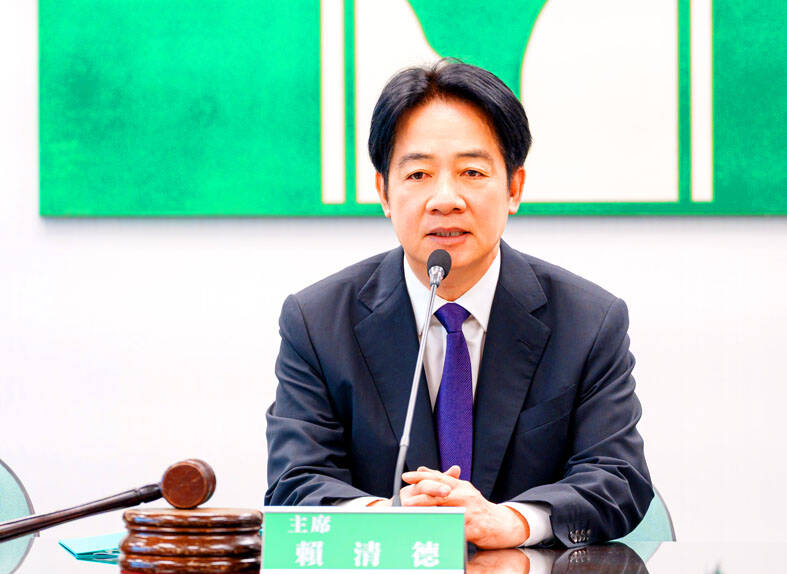President William Lai (賴清德) yesterday apologized for the failure to recall any of the 24 Chinese Nationalist Party (KMT) lawmakers targeted in Saturday’s vote, and said that he would take full responsibility for the results.
“I know many people found the outcome of the recall votes disappointing and regrettable,” Lai, who is also the Democratic Progressive Party (DPP) chairman, said during a routine party Central Standing Committee meeting in Taipei.
“I want to express my deep apology to all the civic groups and supporters who gave their all” to the recall campaigns, he said, thanking them for their hard work collecting petition signatures over the past few months through heat and pouring rain.

Photo courtesy of the Democratic Progressive Party
Lai said he would accept full responsibility for the recall results, but did not elaborate further.
The failure of the recall votes against the 24 KMT lawmakers and suspended Hsinchu Mayor Ann Kao (高虹安), formerly of the Taiwan People’s Party (TPP), ensured that the KMT legislators, along with their TPP allies, would maintain control of the Legislative Yuan.
The DPP must respect and accept the voters’ decision, Lai said.
As the ruling party, the DPP would take the issues brought up through the recall movement seriously, including protecting the constitutional system, safeguarding national security and democratic order, and pursuing more dialogue rather than confrontation, he said.
Every citizen’s voice is the responsibility of the ruling party, he added.
“Going forward, we must turn this disappointment into the courage to stand by our beliefs, while turning regret into determination to initiate reforms,” Lai said.
Seven districts are on Aug. 23 set to hold recall elections targeting KMT legislators, including Deputy Legislative Speaker Johnny Chiang (江啟臣).
“The DPP will continue to stand shoulder to shoulder with every citizen working tirelessly for the recalls,” Lai said.
Moreover, while facing multiple challenges, including the impacts from climate change, shifting international business and trade situations, and coercive actions from authoritarian regimes, Taiwan would not back down, he said, adding that the administration would secure its foothold and respond to them calmly.
The DPP’s mission is to keep Taiwan steadily moving forward, and not let democracy be knocked down, he said.
Separately, Lai formally accepted the resignation of DPP secretary-general Lin Yu-chang (林右昌), which Lin tendered on Sunday after the recall defeat.
DPP Deputy Secretary-General Ho Po-wen (何博文) is to temporarily occupy the position concurrently with his current role, Lai said.

CHAOS: Iranians took to the streets playing celebratory music after reports of Khamenei’s death on Saturday, while mourners also gathered in Tehran yesterday Iranian Supreme Leader Ayatollah Ali Khamenei was killed in a major attack on Iran launched by Israel and the US, throwing the future of the Islamic republic into doubt and raising the risk of regional instability. Iranian state television and the state-run IRNA news agency announced the 86-year-old’s death early yesterday. US President Donald Trump said it gave Iranians their “greatest chance” to “take back” their country. The announcements came after a joint US and Israeli aerial bombardment that targeted Iranian military and governmental sites. Trump said the “heavy and pinpoint bombing” would continue through the week or as long

TRUST: The KMT said it respected the US’ timing and considerations, and hoped it would continue to honor its commitments to helping Taiwan bolster its defenses and deterrence US President Donald Trump is delaying a multibillion-dollar arms sale to Taiwan to ensure his visit to Beijing is successful, a New York Times report said. The weapons sales package has stalled in the US Department of State, the report said, citing US officials it did not identify. The White House has told agencies not to push forward ahead of Trump’s meeting with Chinese President Xi Jinping (習近平), it said. The two last month held a phone call to discuss trade and geopolitical flashpoints ahead of the summit. Xi raised the Taiwan issue and urged the US to handle arms sales to

BIG SPENDERS: Foreign investors bought the most Taiwan equities since 2005, signaling confidence that an AI boom would continue to benefit chipmakers Taiwan Semiconductor Manufacturing Co’s (TSMC, 台積電) market capitalization swelled to US$2 trillion for the first time following a 4.25 percent rally in its American depositary receipts (ADR) overnight, putting the world’s biggest contract chipmaker sixth on the list of the world’s biggest companies by market capitalization, just behind Amazon.com Inc. The site CompaniesMarketcap.com ranked TSMC ahead of Saudi Aramco and Meta Platforms Inc. The Taiwanese company’s ADRs on Tuesday surged to US$385.75 on the New York Stock Exchange, as strong demand for artificial intelligence (AI) applications led to chip supply constraints and boost revenue growth to record-breaking levels. Each TSMC ADR represents

Pro-democracy media tycoon Jimmy Lai’s (黎智英) fraud conviction and prison sentence were yesterday overturned by a Hong Kong court, in a surprise legal decision that comes soon after Lai was jailed for 20 years on a separate national security charge. Judges Jeremy Poon (潘兆初), Anthea Pang (彭寶琴) and Derek Pang (彭偉昌) said in the judgement that they allowed the appeal from Lai, and another defendant in the case, to proceed, as a lower court judge had “erred.” “The Court of Appeal gave them leave to appeal against their conviction, allowed their appeals, quashed the convictions and set aside the sentences,” the judges